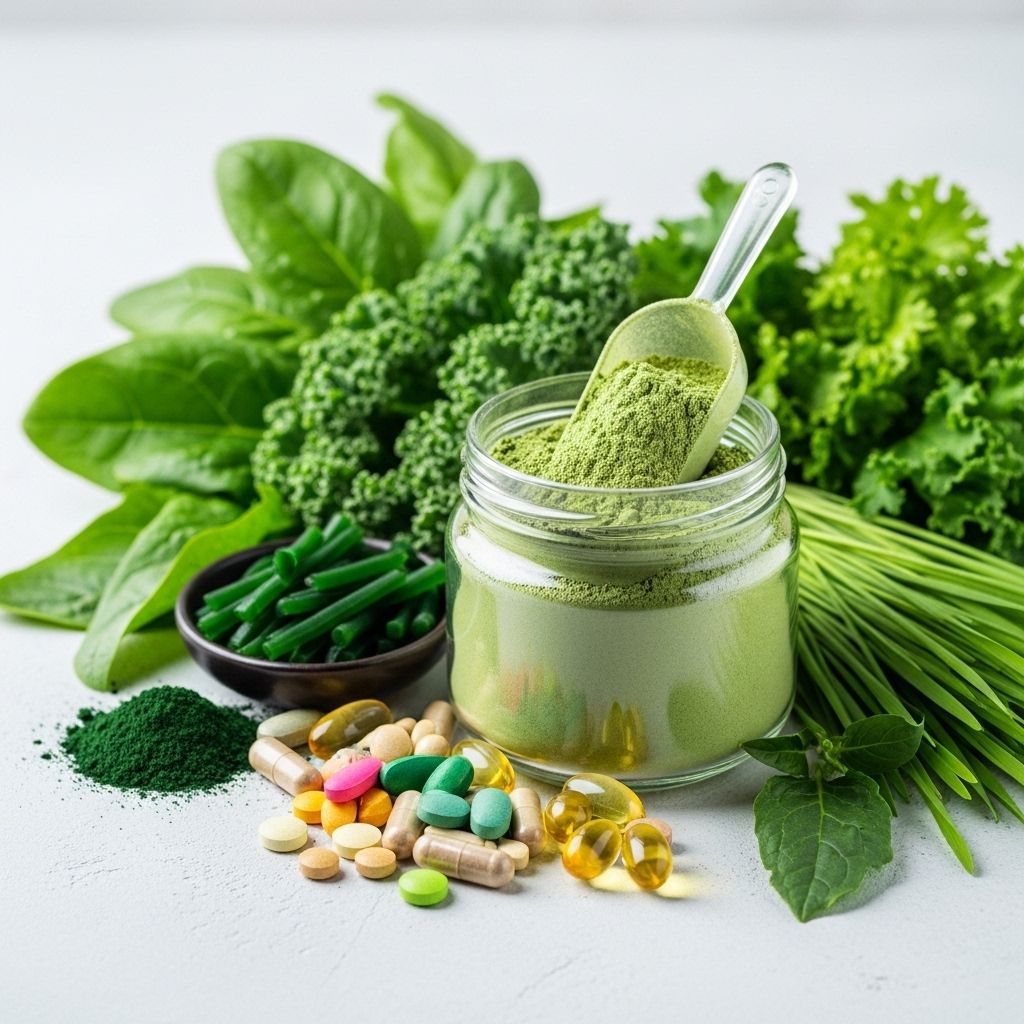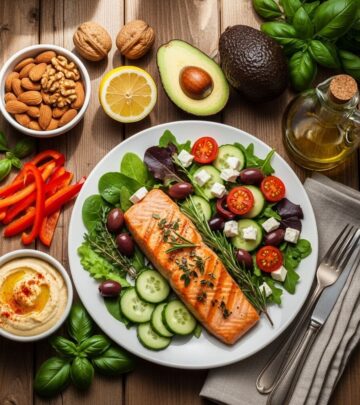Greens Powders: Health Benefits, Drawbacks, and What You Need to Know
Comprehensive guide to greens powders: benefits, nutrition, usage tips, and expert answers to common questions.

Greens powders have surged in popularity, touted as a nutritional shortcut for those seeking a more balanced diet. Sold as a supplement to daily vegetable intake, they promise everything from improved energy and gut health to enhanced immunity. But do these vibrant-green powders deliver on their claims, or are they just another wellness trend? This comprehensive guide explores what greens powders are, their possible benefits, limitations, nutritional facts, cost, and how they compare with whole vegetables.
What Are Greens Powders?
Greens powders are dietary supplements created by drying and powdering various vegetables, fruits, herbs, and superfoods. Common ingredients may include kale, spinach, spirulina, chlorella, wheatgrass, green tea extract, as well as added probiotics, digestive enzymes, and vitamins. Typically, users mix a serving of the powder with water or add it to smoothies and shakes for a quick nutrient boost.
- Primary ingredients: Leafy greens, seaweed, grasses, herbs, fruit extracts, probiotics, and digestive enzymes
- Forms & usage: Sold as powder, capsules, and single-serve packets; mixed with liquid or blended into recipes
- Target users: Individuals who struggle to meet daily recommended servings of fruits and vegetables
What Does Greens Powder Taste Like?
Flavor varies by brand and formulation. Most have an earthy, grassy flavor due to the concentration of green vegetables and seaweed. Some formulas add natural sweeteners, flavors, or herbs to improve palatability. While some people enjoy the ‘green’ taste, others may find it quite strong or bitter. Blending with fruit or flavored drinks can help mask the flavor.
Nutrition Facts for Greens Powder
Nutrition content differs between brands. A typical serving offers:
| Nutrient | Amount (per serving, approx.) | % Daily Value* |
|---|---|---|
| Calories | ~45 | – |
| Protein | 3g | 6% |
| Carbohydrates | 6g | 2% |
| Iron | 3mg | 18% |
| Vitamin A | 540mcg | 60% |
| Vitamin C | Varies | Often over 30% |
*Values are approximate and vary between brands and products.
Many greens powders also contain:
- Antioxidants: Compounds that help reduce oxidative stress.
- Phytonutrients: Plant-based chemicals with potential health-promoting properties.
- Minerals: Potassium, calcium, magnesium, zinc, and more, depending on the blend.
- Probiotics/Prebiotics: Added in some powders for gut support.
Potential Health Benefits of Greens Powders
Research on greens powders is in its early stages; much of the science comes from their individual ingredients. Current studies and expert opinions suggest several possible advantages:
- Convenience: Quick and portable way to add plant-based nutrients when fresh veggies are not available.
- Supplementary Nutrient Support: Can help fill dietary gaps for those not meeting vegetable intake recommendations.
- Energy Boost: Green tea extract, often found in greens powders, provides mild caffeine and antioxidants that may increase alertness.
- Digestive Health: Powders with added probiotics or prebiotics may enhance gut microbiome health and regularity.
- Immune Support: High levels of vitamin C and antioxidants support immune system function.
- Reduction in Oxidative Stress: Small studies indicate potential for decreased oxidative damage in the body.
- Blood Pressure: Some studies suggest certain blends may slightly lower blood pressure.
Limitations of Greens Powders
Despite their convenience, greens powders should not be considered a substitute for whole fruits and vegetables. Here are some key limitations:
- Low Fiber Content: Most greens powders contain 2 grams of fiber or less per serving. In contrast, eating 5 servings of whole produce provides up to 15 grams, which is important for gut and heart health.
- Nutrient Variation: The exact nutrient levels vary greatly, and not all ingredient amounts are disclosed on labels.
- Incomplete Nutrition: Powders cannot provide every phytonutrient or health benefit found in whole vegetables—such as bulk fiber, plant structure, and the synergistic effect of eating fresh foods.
- Lack of Regulation: Supplements, unlike foods, are not tightly regulated. Quality and purity may differ between brands.
- Expense: Greens powders cost substantially more per serving than fresh or frozen vegetables.
Who Should Consider Using Greens Powders?
- Those who travel often or have little access to fresh produce
- People with very busy lifestyles who occasionally miss vegetable servings
- Individuals seeking an easy way to add nutrients to smoothies or shakes
If you already consume ample fruits and vegetables daily, greens powder is likely unnecessary.
Are There Side Effects or Risks?
- Digestive discomfort: Some experience bloating or stomach upset, especially with high-probiotic blends.
- Medication Interactions: Powders containing vitamin K (from greens like kale and spinach) may affect blood-thinner medications. Consult your healthcare provider if you take any prescription medicines.
- Heavy Metals: Some plant-based supplements have tested positive for heavy metals. Look for third-party tested brands.
- Excess vitamins: Beware of powders fortified with high amounts of certain vitamins, which could lead to toxicity with excessive intake.
How Does the Cost Compare to Whole Vegetables?
Greens powders are pricier than whole or frozen vegetables. On average:
- A 30-serving greens powder container costs about $40 (~$1.33 per serving)
- A 12-ounce bag of frozen mixed vegetables costs about $1, which equals four servings (about 25¢ per serving)
Eating frozen or fresh vegetables is typically more cost-effective and delivers more fiber and volume per calorie.
Tips for Choosing a Greens Powder
- Read ingredient lists: Look for brands with transparent ingredient and nutrition labeling.
- Watch for added sugars: Some products add sweeteners. Select those with little or no added sugar.
- Check for third-party testing: Ensure the product is tested for quality and purity.
- Consider nutritional needs: Choose a blend that aligns with your goals (e.g., higher vitamin C, probiotics, or tailored for energy).
- Consult your healthcare provider: If you have chronic conditions, take medications, or are pregnant.
Do Greens Powders Replace Vegetables?
No. Experts universally agree: greens powders should supplement a balanced diet, not replace daily servings of fruits and vegetables. Real vegetables provide crucial fiber, fluids, texture, and a wide array of phytonutrients that supplements cannot fully replicate. The ideal diet includes:
- At least 4–5 servings of fruits and vegetables per day (as recommended by the USDA and the American Heart Association)
- A variety of fresh, frozen, or cooked produce, with greens powder as an occasional boost—not a substitute
Whole vegetables contribute fiber for heart and digestive health, support satiety, and provide the full “entourage effect” of nutrients found in nature.
Ways to Add Greens Powder to Your Diet
- Stir a serving into water, juice, or milk alternatives
- Blend into smoothies with fruits, yogurt, and seeds
- Mix into overnight oats or yogurt bowls
- Bake into muffins or pancake recipes
- Add to soups or dressings as a flavor booster
Frequently Asked Questions (FAQs) about Greens Powders
Q: Are greens powders good for you?
A: Greens powders can be a convenient supplement for people who don’t eat enough vegetables. They may support nutrient intake, energy, immunity, and gut health. However, they do not offer the full health benefits of whole foods and should not replace a balanced, varied diet.
Q: Can greens powders help with digestion?
A: Many blends add probiotics, prebiotics, or digestive enzymes that may help with gut health. Whole vegetables, being naturally high in fiber, are still superior for digestion overall.
Q: Who should avoid greens powders?
A: People taking blood thinners, with kidney disorders, or on prescription medication should talk to their healthcare provider before using these supplements. The high vitamin K content of some blends can interact with certain medications.
Q: How much should I take per day?
A: Most manufacturers recommend one serving per day; follow the label guidance. Do not exceed recommended amounts unless advised by a healthcare provider, as excess intake of certain nutrients can be harmful.
Q: Is it better to use fresh, frozen, or powdered greens?
A: Whole produce—fresh, frozen, or even cooked—provides more fiber and phytonutrients and is more affordable per serving. Greens powders work best as a fill-in when options are limited, not as a staple replacement.
Q: Can children or pregnant women take greens powders?
A: Always consult a pediatrician or OB-GYN before using supplements in children or during pregnancy, as the safety of all ingredients and nutrient doses may not be established for these populations.
Key Takeaways
- Greens powders can help fill occasional nutritional gaps but are not a magic solution or a substitute for vegetables.
- Eat a variety of whole plant foods daily for optimum health.
- Look for transparency, third-party testing, and minimal additives when choosing a powder.
- Consult your healthcare provider for guidance tailored to your needs and medications.
Read full bio of medha deb












